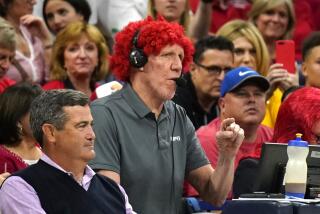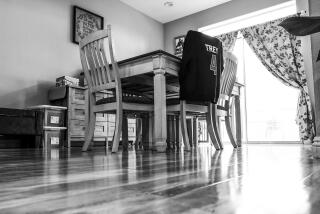COMMENTARY : The Personal Choices, and the Tragedies
- Share via
Their two tragedies this week were totally unrelated except that both victims’ lives revolved around basketball and both died violent, unnecessary deaths barely into adulthood.
You feel equally badly for both of them. Ricky Berry, 24, a promising basketball player with the Sacramento Kings, committed suicide by shooting himself in the head. Carlos Yates, 27, the all-time scoring leader at George Mason University, was gunned down in the street in what apparently was a drug-related killing.
You wonder if anything could have saved these young men and whether big-time sports was a factor in their deaths. And whether they were less prepared for the real world than their less-athletic peers who have fewer opportunities for education, employment, wealth and fame.
On the surface Berry’s death is harder to grasp because he seemingly had a grip on his life. Young, tall and talented, Berry was the first-round pick of the Kings only a year ago. He was recently married, had bought a new house and had a solid rookie year.
In time, the details of Berry’s problems and agony will become public and we might learn why he felt compelled to take his life. This much we do know: A year that started badly enough for the Berrys -- the players at San Jose State walked out on his father the basketball coach -- hit bottom Monday.
The people who know Berry surely feel for him the way Len Bias’s friends felt about him three summers ago. You can’t stop asking why?
Yates’s death is easier to label: another District of Columbia drug-related murder. Berry’s death shocked me; Yates’s did not. While the pain for Yates’s friends and family must be wrenching, life on so many streets for many people in Washington is violent and dangerous. Obviously, he was taking chances and risks.
Yates had played four years of basketball, 1981-85, at George Mason, scoring 2,420 points and helping the Patriots grow in stature within the sport.
For a long time, while Mason’s identity was still being formed, the only name associated with the school was Carlos Yates, basketball player.
Though Yates was a prolific scorer, he was like hundreds of college basketball players: good and sometimes even great. But he was simply not good enough to play in the NBA for any length of time.
I got to know him fairly well toward the end of his career at George Mason, and although I’m no talent scout, it wasn’t hard for me to see that Yates probably would never make it in the NBA. It bothered me that it seemed like making the NBA was the only dream he had. Yates was a smart, conversant young man who had traveled more of the world than 90 percent of people his age.
I was hoping he’d stay and play ball in Europe until he made enough money and matured enough to realize the NBA was not the only thing in his life. He had brains and ability away from basketball. He should have been able to make it even if he could not play.
The last time I saw Yates, at a women’s tennis tournament at George Mason, he was still hoping for an NBA tryout and apparently had lots of time on his hands. Who knows what led him into the city streets and trouble.
As sad as I am for Yates, he was a 27 year old who read the newspaper and who knew exactly what could happen to him if he hung around with the wrong crowd.
In Oxnard, Calif., where the Los Angeles Raiders train and mourn the recent death of teammate Stacey Toran -- who drank and drove himself to a fatal car crash -- veteran Todd Christensen talked to three reporters about athletes taking responsibility for their own lives.
Christensen probably never heard of Carlos Yates, but his comments were appropriate enough for the situation.
“When is the player responsible for his own life?” Christensen asked. “When your one marketable skill is your physical talent, why would you go out and risk that?”
Christensen, of course, didn’t have the answer about Toran, or Yates or any of the athletes who had so much to live for, only to be unable to say, “no” when it counted.
While the vast majority of these talented men are finding life very much worth living at a very lofty, clean level, enough are so self-destructive that you wake up every morning scared to open the newspaper.
More to Read
Go beyond the scoreboard
Get the latest on L.A.'s teams in the daily Sports Report newsletter.
You may occasionally receive promotional content from the Los Angeles Times.










